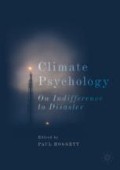Abstract
This chapter argues for the need to take a hard look at our current methodologies, and what it would look like to adopt more innovative approaches to understanding the psycho-social dimensions of climate, energy, and environmental threats. At a time when increasing attention is directed toward understanding people’s motivations, perceptions, and attitudes when it comes to climate change, it behooves us to think very carefully about our research methods. What assumptions are they based on, when it comes to the interplay of subjective and social influences? Are they up to the task? What might we be overlooking? Drawing on a project interviewing conservative Republicans in the States about climate, this chapter argues that paying attention to the “Three A’s”—Anxiety, Ambivalence, and Aspiration—can amplify our investigations, and ideally supplant a reductive tendency to focus on values alone as a key driver of behavior change.
Access this chapter
Tax calculation will be finalised at checkout
Purchases are for personal use only
References
Alcorn, M. (2013). Resistance to learning: Overcoming the desire not to know in classroom teaching. New York: Palgrave Macmillan.
Bateson, G., Jackson, D., Haley, J., & Weakland, J. (1963). A note on the double bind. Family Process, 2, 154–161.
Bollas, C. (1987). The shadow of the object: Psychoanalysis of the unthought known. New York: Columbia University Press.
Cacioppo, J. T., et al. (2002). Do lonely days invade the nights? Potential social modulation of sleep efficiency. Psychological Science, 13, 384–387.
Cartwright, D. (2004). The psychoanalytic research interview: Preliminary suggestions. The Journal of the American Psychoanalytic Association, 52, 209–242.
Haidt, J. (2012). The righteous mind: Why good people are divided by politics and religion. New York: Pantheon.
Hollway, W., & Jefferson, T. (2000). Doing qualitative research differently: Free association, narrative and the interview method. London: Sage.
Kiehl, J. (2016). Facing climate change: An integrated path to the future. New York: Columbia University Press.
Lertzman, R. (2012). Researching psychic dimensions of ecological degradation: Notes from the field. Psychoanalysis, Culture and Society, 17(1), 92–101.
Lertzman, R. (2015). Environmental melancholia: Psychoanalytic dimensions of engagement. London: Routledge.
Miller, W., & Rollnick, S. (2012). Motivational interviewing: Helping people change (3rd ed.). New York: Guilford Press.
Ramachandran, V. S. (1999). Phantoms in the brain: Probing the mysteries of the human mind. New York: Harper Books.
Randall, R. (2009). Loss and climate change: The cost of parallel narratives. Ecopsychology, 3(1), 118–129.
Rich, N. (2018, August 1). Losing earth: The decade we almost stopped climate change. New York Times Magazine. https://www.nytimes.com/interactive/2018/08/01/magazine/climate-change-losing-earth.html.
Shove, E. (2010). Beyond the ABC: Climate change policy and theories of social change. Environment and Planning A, 42(6), 1273–1285.
Stoknes, P. E. (2015). What we think about when we try not to think about climate change. Vermont: Chelsea Green Publishing.
Walkerdine, V., Lucey, H., & Melody, J. (2001). Growing up girl: Psycho-social explorations of gender and class. London: Palgrave Macmillan.
Wallace-Wells, D. (2017, July). The uninhabitable earth. New York Magazine. http://nymag.com/daily/intelligencer/2017/07/climate-change-earth-too-hot-for-humans.html.
Wengraf, T. (2001). Qualitative research interviewing: Biographic narrative and semi-structured methods. London: Sage.
Author information
Authors and Affiliations
Corresponding author
Editor information
Editors and Affiliations
Rights and permissions
Copyright information
© 2019 The Author(s)
About this chapter
Cite this chapter
Lertzman, R. (2019). New Methods for Investigating New Dangers. In: Hoggett, P. (eds) Climate Psychology. Studies in the Psychosocial. Palgrave Macmillan, Cham. https://doi.org/10.1007/978-3-030-11741-2_2
Download citation
DOI: https://doi.org/10.1007/978-3-030-11741-2_2
Published:
Publisher Name: Palgrave Macmillan, Cham
Print ISBN: 978-3-030-11740-5
Online ISBN: 978-3-030-11741-2
eBook Packages: Behavioral Science and PsychologyBehavioral Science and Psychology (R0)

